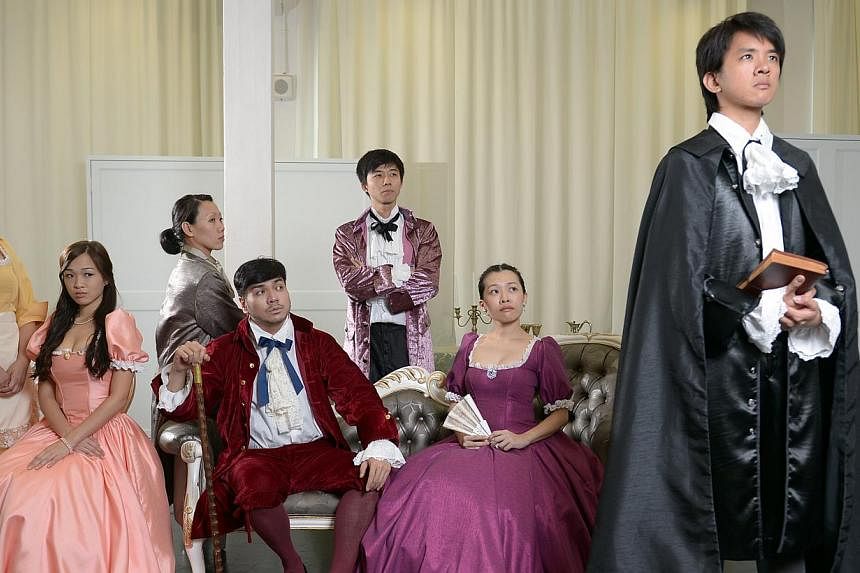To say that Tartuffe offended the French Roman Catholic Church and high society when it was first staged is something of an understatement. This is a farce that so enraged and enthralled its audiences in 1664 that they sought to have it banned in any shape or form, even after the playwright did several rewrites.
Even King Louis XIV, who enjoyed the work and "found it to be extremely diverting", censored it apologetically: "although one does not doubt the good intentions of the author, even so he forbids it in public, and deprived himself of this pleasure, in order not to allow it to be abused by others, less capable of making a just discernment of it."
It is this sort of delightful censure that whets the appetite for plays such as Tartuffe, written by Moliere, the French master of comedy. Unfortunately Nine Years Theatre, which carries a sterling reputation for precision and slick ensemble work, loses its footing in this Mandarin adaptation of the garrulous comedy, weighing down it with a heavy, over-conscientious seriousness.
The titular Tartuffe (Hang Qian Chou), a conman pretending to be a devout, religious figure, attempts to wheedle his way into the good graces of affluent patriarch Orgon (Darius Tan) so that he can marry Orgon's lovely daughter Marianne (Jean Toh), chase the skirts of his wife Elmire (Mia Chee) and inherit all of his money. Everyone can see through Tartuffe's charade - except for Orgon himself.
But this Tartuffe cannot seem to decide if it is a comedy or a cautionary tale. Even if the intention was to leave the play's comic roots behind, all of comedy's component parts are in place, deeply embedded in the play's DNA: the blustering buffoon, the rhythmic entrances and exits, the dialogue set up for witty exchanges and nudge-winks, setting the stage for farce only to realise that it's been completely ignored.
Nelson Chia is a careful and meticulous director - he has strong sense of precision when it comes to calibrating an entire ensemble's emotional arc, and knows how to ratchet up the collective tension that was so beautiful to watch in his take on the courtroom drama Twelve Angry Men (2013) or last year's three-man comedy, Art. This time, however, he just can't seem to let loose.
There is a certain melodic messiness to comedy. It should feel earthy and natural and light to the touch - that's the joy of the farce, that it knifes you in the gut when you aren't looking because you are laughing too hard. Good, side-splitting comedy is so seamless you don't even realise how tightly the ensemble is operating, how well-rehearsed and well-timed their lively exchanges are. Here, you can almost feel the actors counting the steps they take or the seconds they wait to pull off a comedic flourish. The predictability works when the payoff is worth the wait, but those explosive moments of "I told you so" comedy are few and far between.
The ensemble also does not seem strong enough to carry the extravagant humour forward. The only actor who truly holds her own is the wonderful Jalyn Han, a seasoned hand on the Chinese theatre stage, who brings a bounce into every step. Her maidservant Dorine is the wonderful subversion of Juliet's Nurse; she is smart and sarcastic and animated, and laughter follows in her wake. There's a gleeful moment where she attempts to protect the entire family from Tartuffe like a mother hen shielding her brood in the traditional children's game of lao ying zhua xiao ji (literally, "the eagle catches young chicks").
But she is the only bright spot in a fog of otherwise leaden delivery. The ensemble is so over-timed and so over-orchestrated that there is a stiffness to most of the actors. It could be a stiltedness borne of the language, which does not help by trapping them in long, philosophical arguments they can't quite break out of, but there is also a lack of charisma to bolster characters who should be leaping off the page. It is difficult to see why anyone would fall for actor Hang's Tartuffe, whose presence hardly made a dent on stage.
The best moments are those rich in bawdy double entendres, where the actors can really dig into raucous, fun exchanges, and even then, it comes too little, too late. The English supertitles could have been timed for rapid banter, but they were so pompous and verbose that they lost all sense of the snappy exchanges taking place below, leaving non-Mandarin-speaking audiences in the lurch as they waded through enormous paragraphs of unwieldy text that trailed on well beyond the on-stage punchline.
Chia is an intelligent, cerebral director, and I have no doubt that he grasped how emblematic this comedy could have been of the many hypocrisies that still plague us today, whether in terms of religion or politics. The question is - should the play adhere religiously to classical convention, or attempt to engage the audience on a contemporary footing, easing up on the dated language and finding entry points that retain the original script's fast-paced humour?
Sadly, this cautious, plodding Tartuffe has removed its tongue from its cheek and, in the process, has also lost its bite.
Follow Corrie Tan on Twitter @CorrieTan
Tartuffe is sold out.


